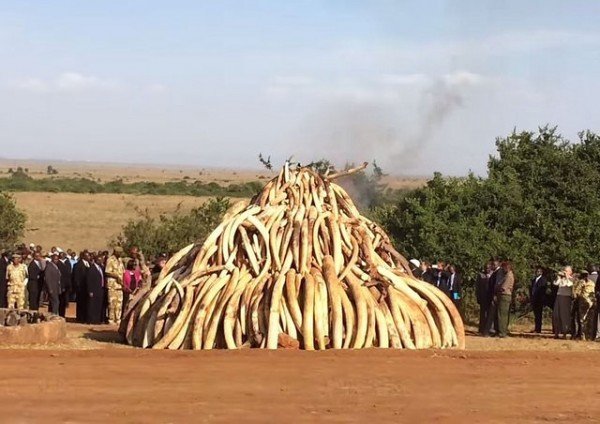The government of Kenya in cooperation with the Kenya Wildlife Service recently sent 105 tons of ivory up in flames, burning the massive stockpile as evidence of their zero-tolerance policy toward poaching and the illegal wildlife trade. 1.5 tons of confiscated rhino horn was destroyed simultaneously.
As the insatiable demand for ivory continues, the plight of elephants grows more critical. More than 100,000 elephants were lost to poaching across Africa between 2010 and 2012 – which equates to one elephant being killed every 15 minutes by poachers who then harvested the ivory tusks.
Proceeds from this illegal wildlife trade have been used to fund criminal activity, armed conflicts, and terrorism. Thousands of wildlife rangers across the continent have been killed or injured attempting to protect the animals from poachers.
Why the burn? The Kenyan government hopes that the powerful imagery will draw attention to the plight these animals face and will convince people to stop buying ivory products. Experts have warned that at the current kill rate, elephants and rhino face extinction that could occur within the next 15 to 20 years.
In the past few years heavily-armed poachers have used military tactics to wipe out tens of thousands of African elephants. Many of the tusks enter an underground pipeline to Asia – especially to China – where ivory is used to make eyeglass frames, combs, statuettes, jewelry and trinkets.
At current ivory value the bonfire represents $105 million going up in flames. The street price of one kilogram of ivory is around $1,000. The smoke-filled sky over Nairobi during the burn represented 6,000 to 7,000 dead elephants.
Kenya is trying to show the world they are very serious about ending the illegal slaughter that’s a result of the worldwide ivory trade: a trade that means death to both their elephants and their national heritage. The aim is to make ivory valueless as a commodity and to encourage other countries to destroy their ivory stockpiles, too.
Ivory poaching is a shameful activity and the Kenyan government is determined to make the statement that ivory is worthless – unless it’s on a living elephant.
Photo credit: International Fund for Animal Welfar — Flickr CC








